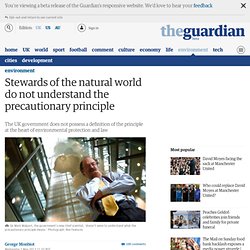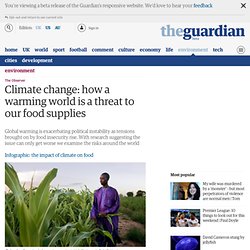

Stewards of the natural world do not understand the precautionary principle. Here's something remarkable I stumbled across while researching my column on Monday, but did not have room to include.

I hope you'll agree that it is worth sharing. I was trying to understand the context for the new chief scientist's cavalier treatment of scientific evidence, in an article he wrote opposing a European ban on neonicotinoid pesticides. These are the toxins which, several studies suggest, could be partly responsible for the rapid decline in bees and other pollinators. Just one month into the job, Sir Mark Walport has, I believe, disgraced himself: by misrepresenting the science, misinforming the public about risk and uncertainty and indulging in scaremongering and wild exaggeration in support of the government's position.
I believe he has seriously damaged his standing and that of the office he holds. Eu_referendum_environment.pdf. Global carbon dioxide in atmosphere passes milestone level. For the first time in human history, the concentration of climate-warming carbon dioxide in the atmosphere has passed the milestone level of 400 parts per million (ppm).

The last time so much greenhouse gas was in the air was several million years ago, when the Arctic was ice-free, savannah spread across the Sahara desert and sea level was up to 40 metres higher than today. These conditions are expected to return in time, with devastating consequences for civilisation, unless emissions of CO2 from the burning of coal, gas and oil are rapidly curtailed. But despite increasingly severe warnings from scientists and a major economic recession, global emissions have continued to soar unchecked. Beware the rise of the government scientists turned lobbyists. What happens to people when they become government science advisers?

Are their children taken hostage? Is a dossier of compromising photographs kept, ready to send to the Sun if they step out of line? I ask because, in too many cases, they soon begin to sound less like scientists than industrial lobbyists. The mad cow crisis 20 years ago was exacerbated by the failure of government scientists to present the evidence accurately. The chief medical officer wrongly claimed that there was "no risk associated with eating British beef". Lu Guang's The Polluted Landscape: the camera never lies, even in China - audio slideshow. Why can't we quit fossil fuels? We have far more oil, coal and gas than we can safely burn.

For all the millions of words written about climate change, the challenge really comes down to this: fuel is enormously useful, massively valuable and hugely important geopolitically, but tackling global warming means leaving most of it in the ground – by choice. Although we often hear more about green technology, consumption levels or population growth, leaving fuel in the ground is the crux of the issue. After all, the climate doesn't know or care how much renewable or nuclear energy we've got, how efficient our cars and homes are, how many people there are, or even how we run the economy. It only cares how much globe-warming pollution we emit – and that may be curiously immune to the measures we usually assume will help. The Burning Question: We can’t burn half the world’s oil, coal and gas. There are three facts that tell you all you really need to know about climate science and politics. Chinese vessel on Philippine coral reef caught with illegal pangolin meat. Climate change: how a warming world is a threat to our food supplies.
When the Tunisian street vendor, Mohamed Bouazizi, set himself on fire on 17 December 2010, it was in protest at heavy-handed treatment and harassment in the province where he lived.

But a host of new studies suggest that a major factor in the subsequent uprisings, which became known as the Arab spring, was food insecurity. Drought, rocketing bread prices, food and water shortages have all blighted parts of the Middle East. Analysts at the Centre for American Progress in Washington say a combination of food shortages and other environmental factors exacerbated the already tense politics of the region. Millions face starvation as world warms, say scientists.
Millions of people could become destitute in Africa and Asia as staple foods more than double in price by 2050 as a result of extreme temperatures, floods and droughts that will transform the way the world farms.

As food experts gather at two major conferences to discuss how to feed the nine billion people expected to be alive in 2050, leading scientists have told the Observer that food insecurity risks turning parts of Africa into permanent disaster areas. Rising temperatures will also have a drastic effect on access to basic foodstuffs, with potentially dire consequences for the poor. Frank Rijsberman, head of the world's 15 international CGIAR crop research centres, which study food insecurity, said: "Food production will have to rise 60% by 2050 just to keep pace with expected global population increase and changing demand. Climate change comes on top of that. The annual production gains we have come to expect … will be taken away by climate change. Nature lies dormant ahead of first day of spring.
Had Thomas taken the same route today, he might not have seen very much wildlife – and could well have frozen.

Mist and fog, rain, a bitter north wind, and temperatures just above freezing are forecast for , the first "official" day of spring. The runup, says the Met Office, has been marked by deep snow blanketing much of eastern Scotland, temperatures as low as -8C in Oxfordshire, very few daffodils blooming in Wales, weather warnings in the north of England, nature hibernating and occasional bursts of spring sunshine. It is, says Matthew Oates, a naturalist working with the National Trust, the opposite of the same time last year, when a heatwave combined with a drought and resulted in wildfires, hosepipe bans, packed beaches and record sales of ice cream and garden plants.
Environmental threats could push billions into extreme poverty, warns UN. The number of people living in extreme poverty could increase by up to 3 billion by 2050 unless urgent action is taken to tackle environmental challenges, a major UN report warned on Thursday.

The 2013 Human Development Report hails better than expected progress on health, wealth and education in dozens of developing countries but says inaction on climate change, deforestation, and air and water pollution could end gains in the world's poorest countries and communities. Fracking company Cuadrilla halts operations at Lancashire drilling site. EDF drops lawsuit against environmental activists after backlash. EDF's West Burton power station in Nottinghamshire.

The energy firm claims activists caused damage in excess of £5m. Photograph: Christopher Furlong/Getty Images The energy company EDF has dropped a £5m civil lawsuit against a group of 21 activists who occupied one of its gas-fired power plants for a week in October 2012, in a move described by supporters of the demonstrators as a "humiliating climbdown". EDF faced a strong public backlash against its civil suit, which was described by opponents as an attempt to undermine peaceful protest in the UK, after details of the action were published in the Guardian.
Eric Pickles to face judicial review over energy efficiency row. Eric Pickles' Department of Communities and Local Government (DCLG) will face a day in court over its controversial decision to scrap energy efficiency rules that would have delivered an estimated £11bn boost to the economy.

The Association for the Conservation of Energy (ACE) confirmed this afternoon that it will make good on its threat to seek to a Judicial Review over Pickles' decision late last year to scrap the "consequential improvement" rules. The regulations would have required households and businesses undertaking extension work to ensure their properties meet minimum energy efficiency standards and were seen as a central plank of the government's wider efficiency strategy. He added that ACE would now serve formal documents to the High Court on Friday with a view to overturning the Secretary of State's decision and ultimately securing the reinstatement of rules that the government's own modelling suggested would deliver significant economic and environmental gains.
How extreme weather acts as a catalyst for climate concern. Against a backdrop of lukewarm sentiment about environmental issues globally, levels of concern about climate change in Wales are at their highest for many years. The Twisted Ethics of Environmental Protest » Climate Resistance. Environmental activism is most noted for ‘direct action’ — behaviour that has two fundamental characteristics. 1. It is highly visible. 2. It is disruptive to the operations of some activity or other. Direct action is necessary, I have argued, because the environmental movement isn’t a movement at all. Climate sceptics 'capture' the Weblog Awards science category. February is the best month of the year for fans of emotional acceptance speeches.
Baftas, Oscars, Grammys, the Brits - there's a lot of mothers and agents to thank. Ever since 2001, blogs have had their own opportunity to have their moment in the spotlight and chance to bath in adulation. EDF's vengeful £5m No Dash for Gas lawsuit is corporate and PR suicide. "Who breaks a butterfly upon a wheel? " Secret funding helped build vast network of climate denial thinktanks.
Satellite eye on Earth: January 2013 - in pictures. Centrica withdraws from new UK nuclear projects. Energy company Centrica has abandoned its plans for building new nuclear reactors in the UK, blaming rising costs and construction delays. Should we stop worrying about the environmental impact of flying? Sunspots do not cause climate change, say scientists - Climate Change - Environment. The researchers – all experts in climate or solar science – have told The Independent that the scientific evidence continually cited by sceptics to promote the idea of sunspots being the cause of global warming is deeply flawed.
Studies published in 1991 and 1998 claimed to establish a link between global temperatures and solar activity – sunspots – and continue to be cited by climate sceptics, including those who attended an "alternative" climate conference in Copenhagen last week. Whatever happened to the 'coldest May in 100 years'? Boris Johnson says snow casts doubt on climate change science. Black carbon causes twice as much global warming than previously thought. What exactly is in Beijing's polluted air? As Australia heatwave hits new high, warning that bushfires will continue. Speech at 2nd World Climate Conference. [Introduction] Mr. Almost half of the world's food thrown away, report finds.